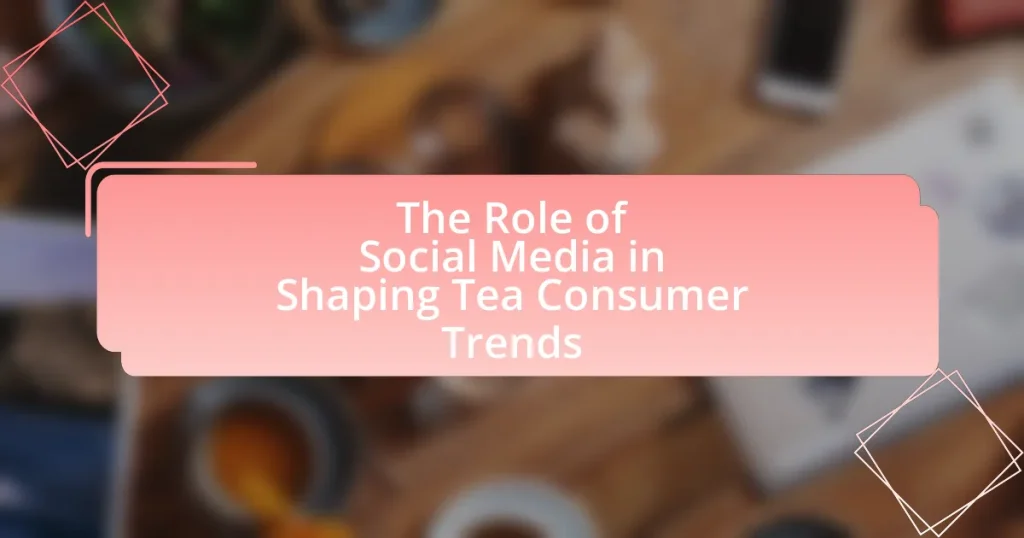The article examines the significant role of social media in shaping tea consumer trends, highlighting how platforms like Instagram and TikTok influence purchasing decisions and brand perceptions. It discusses the impact of social media on consumer behavior, emphasizing the effectiveness of visual content and user-generated posts in driving brand loyalty and sales. Key trends such as the rise of specialty teas and health-focused blends are explored, along with the challenges tea brands face in a competitive digital landscape. The article also outlines strategies for effective social media engagement and predicts future trends in consumer behavior within the tea market.

What is the Role of Social Media in Shaping Tea Consumer Trends?
Social media plays a crucial role in shaping tea consumer trends by influencing purchasing decisions and brand perceptions. Platforms like Instagram and Facebook allow tea brands to showcase their products visually, engage with consumers through interactive content, and leverage user-generated content to build community and trust. According to a study by the Pew Research Center, 69% of adults in the U.S. use social media, making it a significant channel for brands to reach potential customers. Additionally, trends such as the rise of specialty teas and health-focused blends are often driven by social media influencers who promote these products to their followers, thereby impacting consumer preferences and market dynamics.
How does social media influence consumer behavior in the tea market?
Social media significantly influences consumer behavior in the tea market by shaping perceptions, driving trends, and facilitating engagement. Platforms like Instagram and Facebook allow brands to showcase their products visually, leading to increased brand awareness and consumer interest. For instance, a study by the Journal of Business Research found that 79% of consumers are influenced by social media posts when making purchasing decisions. Additionally, user-generated content, such as reviews and photos, enhances trust and credibility, further impacting consumer choices. This interaction creates a community around tea brands, fostering loyalty and encouraging repeat purchases.
What specific platforms are most impactful in shaping tea consumer trends?
Instagram and TikTok are the most impactful platforms in shaping tea consumer trends. Instagram’s visual-centric approach allows brands to showcase aesthetically pleasing tea products and engage with consumers through influencers, driving trends like specialty teas and unique brewing methods. TikTok’s short-form video format enables rapid dissemination of tea-related content, including recipes and brewing tips, which can quickly go viral and influence purchasing decisions. According to a 2022 survey by Statista, 54% of consumers reported discovering new tea brands through social media, highlighting the significant role these platforms play in shaping consumer preferences and trends in the tea market.
How do social media campaigns affect tea purchasing decisions?
Social media campaigns significantly influence tea purchasing decisions by shaping consumer perceptions and preferences. Research indicates that 54% of social media users rely on these platforms for product recommendations, which directly impacts their buying choices. Additionally, visually appealing content, such as images and videos of tea products shared on platforms like Instagram and Facebook, enhances brand visibility and engagement, leading to increased sales. A study by the Journal of Marketing Research found that user-generated content on social media can boost consumer trust and encourage purchases, demonstrating the effectiveness of social media campaigns in driving tea sales.
Why is social media important for tea brands?
Social media is important for tea brands because it enables direct engagement with consumers, fostering brand loyalty and awareness. By utilizing platforms like Instagram and Facebook, tea brands can showcase their products visually, share brewing tips, and connect with a community of tea enthusiasts. According to a study by the Pew Research Center, 69% of adults in the U.S. use social media, making it a vital channel for reaching a broad audience. Additionally, social media allows for real-time feedback and interaction, which can inform product development and marketing strategies, ultimately driving sales and enhancing customer satisfaction.
What advantages do tea brands gain from engaging on social media?
Tea brands gain increased visibility and customer engagement by engaging on social media. This platform allows them to reach a broader audience, fostering brand awareness and loyalty. For instance, a study by Sprout Social indicates that 64% of consumers want brands to connect with them on social media, highlighting the importance of interaction. Additionally, social media enables tea brands to showcase their products visually, share customer testimonials, and promote special offers, which can lead to higher sales conversions. Engaging content can also drive user-generated content, further enhancing brand credibility and community building.
How does social media help in building brand loyalty among tea consumers?
Social media helps in building brand loyalty among tea consumers by facilitating direct engagement and fostering community around tea brands. This engagement allows brands to share content that resonates with consumers, such as brewing tips, health benefits, and user-generated content, which enhances emotional connections. According to a study by the Journal of Marketing Research, 70% of consumers feel more connected to brands that engage with them on social media, leading to increased loyalty. Additionally, social media platforms enable brands to respond quickly to customer inquiries and feedback, reinforcing trust and satisfaction among tea consumers.
What are the key trends in tea consumption driven by social media?
Key trends in tea consumption driven by social media include the rise of specialty teas, increased interest in health benefits, and the popularity of visually appealing tea presentations. Specialty teas, such as matcha and herbal blends, have gained traction as influencers showcase unique flavors and brewing methods, leading to a 20% increase in specialty tea sales from 2020 to 2022. Social media platforms also highlight the health benefits of tea, with hashtags like #TeaHealth garnering millions of views, promoting teas known for their antioxidant properties and calming effects. Additionally, aesthetically pleasing tea presentations, often shared on platforms like Instagram, have encouraged consumers to invest in high-quality tea accessories, contributing to a 15% growth in tea-related product sales.
How have consumer preferences shifted due to social media influence?
Consumer preferences have shifted significantly due to social media influence, leading to increased demand for authentic and visually appealing products. Social media platforms, particularly Instagram and TikTok, have popularized visually-driven content, prompting consumers to seek out products that are not only high-quality but also aesthetically pleasing for sharing online. For instance, a study by the Pew Research Center found that 72% of teens feel pressure to look their best on social media, which translates into a preference for products that enhance their online image. Additionally, brands that engage with consumers through social media and showcase user-generated content have seen a 20% increase in customer loyalty, indicating that social media not only influences initial purchasing decisions but also fosters long-term brand relationships.
What role do influencers play in promoting tea consumption trends?
Influencers play a significant role in promoting tea consumption trends by leveraging their social media platforms to showcase various tea products and lifestyles associated with tea drinking. Their endorsements and authentic content create a sense of trust and relatability, which can lead to increased consumer interest and sales. For instance, a study published in the Journal of Marketing Research found that influencer marketing can yield an ROI of up to 11 times the initial investment, demonstrating its effectiveness in driving consumer behavior. Additionally, influencers often share personal experiences and health benefits related to tea, further encouraging their followers to adopt tea consumption as part of their daily routines.
How does social media facilitate community building among tea enthusiasts?
Social media facilitates community building among tea enthusiasts by providing platforms for interaction, sharing, and collaboration. These platforms, such as Facebook groups, Instagram, and Twitter, allow tea lovers to connect globally, share their experiences, and exchange knowledge about different tea varieties and brewing techniques. For instance, a study by the Pew Research Center indicates that 69% of adults in the U.S. use social media, creating a vast network where tea enthusiasts can engage in discussions, participate in virtual tastings, and organize events. This connectivity fosters a sense of belonging and community, as members can support each other in their tea journeys and celebrate their shared passion.
What types of online communities exist for tea lovers on social media?
Online communities for tea lovers on social media include dedicated groups on platforms like Facebook, Instagram, and Reddit, where enthusiasts share experiences, recipes, and product recommendations. These communities often focus on specific interests such as loose-leaf tea, herbal blends, or tea brewing techniques, fostering engagement through discussions, live tastings, and events. For instance, Facebook groups like “Tea Lovers” and “Loose Leaf Tea” have thousands of members who actively participate in sharing knowledge and experiences, demonstrating the vibrant nature of these online spaces.
How do these communities impact consumer choices and trends?
Communities on social media significantly influence consumer choices and trends by fostering engagement and sharing information about products. These platforms enable users to exchange reviews, recommendations, and experiences, which directly affect purchasing decisions. For instance, a study by Nielsen found that 92% of consumers trust recommendations from friends and family over any other form of advertising, highlighting the power of community influence. Additionally, social media trends, such as viral challenges or influencer endorsements, can rapidly shift consumer preferences, as seen with the rise of specialty teas promoted by popular influencers, leading to increased sales and brand visibility.
What challenges do tea brands face on social media?
Tea brands face significant challenges on social media, primarily due to intense competition and the need for effective engagement strategies. The tea market is saturated with numerous brands vying for consumer attention, making it difficult for individual brands to stand out. Additionally, tea brands must navigate the complexities of creating authentic content that resonates with diverse audiences while adhering to platform algorithms that prioritize engagement metrics. According to a report by Statista, 54% of consumers expect brands to engage with them on social media, highlighting the necessity for tea brands to develop interactive and responsive communication strategies to foster brand loyalty.
How can negative feedback on social media affect tea brands?
Negative feedback on social media can significantly harm tea brands by damaging their reputation and reducing consumer trust. When consumers share negative experiences or opinions online, it can lead to a rapid spread of unfavorable perceptions, influencing potential buyers’ decisions. For instance, a study by the Pew Research Center found that 70% of consumers trust online reviews, indicating that negative comments can deter new customers and lead to decreased sales. Additionally, brands may face increased scrutiny and pressure to respond, which can strain resources and impact overall brand image.
What strategies can tea brands use to overcome social media challenges?
Tea brands can overcome social media challenges by implementing targeted content strategies, engaging with their audience authentically, and leveraging analytics for continuous improvement. Targeted content strategies involve creating posts that resonate with specific demographics, such as health-conscious consumers or millennials, which can increase engagement rates. Engaging authentically with the audience through interactive posts, responding to comments, and sharing user-generated content fosters community and loyalty. Additionally, utilizing analytics tools allows tea brands to track performance metrics, understand consumer preferences, and adjust their strategies accordingly, ensuring that their social media presence remains relevant and effective.
How can tea brands effectively leverage social media for marketing?
Tea brands can effectively leverage social media for marketing by creating engaging content that resonates with their target audience. This includes utilizing visually appealing images and videos of tea products, sharing brewing tips, and highlighting health benefits associated with tea consumption. According to a study by Sprout Social, 70% of consumers feel more connected to brands with a strong social media presence, which emphasizes the importance of consistent interaction and community building. Additionally, tea brands can collaborate with influencers who align with their values, as influencer marketing has been shown to increase brand awareness and trust among consumers. By analyzing engagement metrics and consumer feedback, tea brands can refine their strategies to better meet the preferences of their audience, ultimately driving sales and brand loyalty.
What best practices should tea brands follow for social media engagement?
Tea brands should prioritize authentic storytelling and community engagement for effective social media engagement. Authentic storytelling allows brands to connect emotionally with consumers, showcasing the origins, benefits, and unique qualities of their teas. Community engagement fosters a sense of belonging among followers, encouraging user-generated content and interactions that enhance brand loyalty. According to a study by Sprout Social, 70% of consumers feel more connected to brands that engage with them on social media, highlighting the importance of these practices in building relationships and driving sales.
How can tea brands measure the success of their social media campaigns?
Tea brands can measure the success of their social media campaigns through key performance indicators (KPIs) such as engagement rates, follower growth, and conversion rates. Engagement rates, which include likes, shares, and comments, indicate how well the content resonates with the audience; for instance, a 2% engagement rate is considered average across industries. Follower growth reflects the brand’s expanding reach and potential customer base, while conversion rates show the percentage of social media interactions that lead to sales, with an average conversion rate of 1-3% being typical for e-commerce. By analyzing these metrics, tea brands can assess the effectiveness of their campaigns and make data-driven adjustments to enhance their social media strategies.
What future trends can we expect in the role of social media in tea consumption?
Future trends in the role of social media in tea consumption will likely include increased influencer marketing, enhanced user-generated content, and the rise of niche communities. Influencer marketing will continue to grow as brands collaborate with tea enthusiasts and lifestyle influencers to reach targeted audiences, leveraging their credibility to drive sales. User-generated content will become more prominent, as consumers share their tea experiences on platforms like Instagram and TikTok, creating authentic engagement and fostering brand loyalty. Additionally, niche communities focused on specific types of tea, such as herbal or specialty blends, will emerge, allowing consumers to connect over shared interests and preferences, further shaping consumption patterns. These trends are supported by the increasing reliance on social media for product discovery, with 54% of consumers stating they use social media to research products before purchasing.
How might emerging technologies influence social media’s impact on tea trends?
Emerging technologies significantly enhance social media’s influence on tea trends by enabling more personalized and interactive consumer experiences. For instance, artificial intelligence algorithms analyze user preferences and behaviors, allowing brands to tailor content that resonates with specific audiences, thereby increasing engagement and driving trends. Additionally, augmented reality applications allow consumers to visualize tea products in their own environments, enhancing the shopping experience and influencing purchasing decisions. According to a report by Statista, 54% of social media users engage with brands through interactive content, highlighting the effectiveness of these technologies in shaping consumer behavior.
What predictions can be made about consumer behavior in the tea market?
Predictions about consumer behavior in the tea market indicate a growing preference for premium and specialty teas, driven by increased health consciousness and the influence of social media. Research shows that 75% of consumers are more likely to purchase products endorsed by social media influencers, highlighting the significant impact of online platforms on purchasing decisions. Additionally, the rise of wellness trends has led to a surge in demand for herbal and functional teas, with the global herbal tea market projected to reach $3.5 billion by 2027. This shift reflects a broader trend where consumers prioritize quality and health benefits, influenced by social media marketing strategies that emphasize lifestyle and wellness narratives.
What practical tips can tea brands implement for social media success?
Tea brands can achieve social media success by creating engaging content that resonates with their target audience. This includes utilizing visually appealing images and videos of tea preparation, highlighting unique flavors, and sharing user-generated content to foster community engagement. Additionally, brands should leverage social media analytics to understand consumer preferences and optimize their posting schedule for maximum reach. According to a study by Sprout Social, posts with images receive 650% higher engagement than text-only posts, underscoring the importance of visual content in capturing audience attention.


